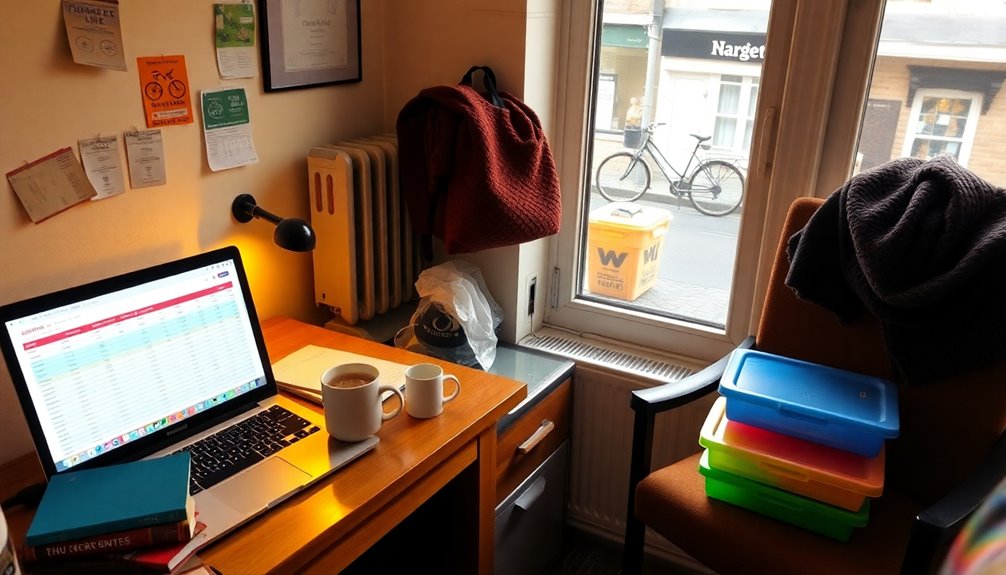
You’ll typically need €900–€1,600 a month to cover rent, bills, food and transport as an English student in Ireland, with Dublin at the high end and Cork or Galway cheaper. You can save by sharing flats, cooking at home, using student transport passes, and hunting for secondhand textbooks. Factor in tuition, insurance and occasional nights out. Keep a clear monthly budget and smart apps to track spending — keep going to find practical saving tips and options.
Highlights
- Expect higher accommodation costs in Dublin; shared flats and on-campus halls are cheaper alternatives.
- Budget €30–€60 weekly for groceries; cooking at home greatly reduces food spending.
- Use student Leap Cards, monthly passes, or cycling to cut commuting costs.
- Factor tuition, textbooks, course fees, and software into overall expenses and seek secondhand materials.
- Allocate funds for health insurance, GP visits, leisure, and apply for scholarships or university bursaries.
Monthly Accommodation Costs in Irish Cities
When you’re budgeting for study in Ireland, accommodation will likely be your biggest monthly expense. You’ll find student housing ranges from university dorms to shared flats, and costs vary by city — Dublin is pricier, while smaller cities like Cork or Galway are kinder to your wallet. If you crave independence, private rental options let you choose location and lifestyle, though you’ll pay more and handle bills yourself. Shared houses cut costs and give social freedom, but expect compromises on space. Short-term lets or homestays suit flexible plans, while on-campus halls simplify budgeting. Compare prices, contracts, and commute times so you can pick the rental option that matches your need for autonomy without breaking your budget.
Food and Grocery Expenses for Students
You’ll want to set a realistic weekly grocery budget — many students manage on €30–€60 depending on shopping habits and whether you share meals. Eating out is pricier, with casual pub meals or campus cafes typically costing €8–€15 and restaurants more. Balancing cooking at home with occasional treats will keep your food costs under control.
Weekly Grocery Budget
A realistic weekly grocery budget for a student in Ireland usually falls between €40 and €70, depending on whether you cook most meals or rely on ready-to-eat options. You can stretch that amount by smart grocery shopping and simple meal planning: buy store-brand staples, shop seasonal produce, and choose versatile ingredients that last. Cooking at home gives you freedom over taste and cost, letting you trade expensive impulse buys for nourishing, budget-friendly meals. Keep a running list, compare unit prices, and set aside a small treat budget so you don’t feel deprived.
- Relief when your meal prep saves money and time
- Pride in feeding yourself well on a tight budget
- Joy in discovering cheap, delicious recipes
- Confidence from mastering your weekly spend
Eating Out Costs
Cooking at home will save you money, but eating out is still part of student life and can change your weekly budget quickly. You’ll want to balance restaurant prices with freedom to explore local cuisine and varied dining experiences. Look for student menus and meal deals near campus so you can enjoy nights out without overspending. Consider your food preferences — shared plates or takeaway options stretch funds and let you sample cultural differences across neighborhoods. Choose budget meals at markets or weekday specials, and swap a pricey dinner for a pub meal when you’re socialising. Simple dining tips: set a weekly eating-out cap, use apps for discounts, and prioritise experiences that matter to you while keeping costs controlled.
Transportation: Commuting and Discount Options
You’ll want to break down commuting costs by mode — buses, trains, trams, and cycling — to see where your money goes. Compare single fares with monthly and student passes to find the cheapest rhythm for your schedule. Many operators offer student discounts or leap cards that cut costs considerably, so check eligibility and routes before you commit.
Commuting Costs Breakdown
While living in Ireland you’ll quickly notice transport can be one of your biggest regular expenses, so it helps to understand typical fares and how discounts work. You’ll compare public transport types and quick commuting options to decide what fits your lifestyle. City buses and trams cost less per trip but add up; regional trains give speed for longer hops; cycling or scootering cuts cash outflow and frees you from timetables. Plan routes to keep control of your budget and your time.
- Feel the relief when a cheap bus saves your week.
- Enjoy the freedom of hopping on a fast suburban train.
- Savor the independence of biking past gridlock.
- Smile knowing small choices stretch your budget.
Discount and Passes
After you’ve mapped your routes and chosen whether to bike, bus or catch the train, next look at the discount options that’ll cut your commuting bill. You’ll want to grab discount cards and student passes early — they’re the fastest way to save and keep your schedule flexible. Student passes often give monthly or semester discounts; discount cards can offer pay-as-you-go reductions and multi-journey deals. Compare city versus regional offers, and consider Leap Card top-ups or rail student fares. Keep receipts and ID ready to apply for programmes. Choosing the right pass frees you to explore without overspending, so pick the option that matches your routine and embrace the independence it brings.
| Option | Benefit |
|---|---|
| Leap Card | Lower fares |
| Student Pass | Semester savings |
| Monthly Pass | Unlimited travel |
| Rail Card | Off-peak deals |
| Multi-ride | Bulk discount |
Utility Bills and Internet Charges
Managing utility bills and internet charges is one of those regular costs you’ll want to budget for from day one. You’ll encounter different utility payment types — standing charges, usage-based bills, and prepay meters — so choose what fits your lifestyle. Compare internet service providers for speed, price, and contract flexibility so you’re not tied down. Expect to split bills if you share accommodation, and shop around yearly to keep costs low.
- Relief when a cheap plan frees your budget
- Annoyance when hidden fees steal your calm
- Confidence when you control payments and switch easily
- Joy when reliable Wi‑Fi lets you work and explore Ireland
Plan monthly, automate payments, and keep options open.
Tuition Fees and Course-Related Costs
You’ll want to budget for tuition fees, which can vary widely depending on institution and course level. Don’t forget course materials like textbooks and software, which add a steady but often overlooked cost. Also check for exam, registration and certificate fees that may be charged separately.
Tuition Fee Ranges
Tuition fees for English courses in Ireland vary widely depending on course length, institution type, and whether you’re a short-term visitor or enrolling in a longer accredited program. You’ll find budget-friendly language schools charging modest weekly rates, immersive private academies with premium pricing, and university-linked programs that cost more but offer credits and support. Do a tuition fee comparison so you can match cost to freedom: shorter options let you pivot quickly; longer programs may reveal scholarship opportunities or part-time work eligibility. Balance what you pay with flexibility you want, and don’t assume higher cost means better fit—your goals matter more.
- Relief when a cheap course still delivers growth
- Excitement finding a scholarship opportunity
- Courage to choose flexible dates
- Pride in smart budgeting
Course Materials Costs
Beyond just course fees, you’ll need to budget for the materials and extras that keep your learning on track. When you choose a program, your course selection affects costs: intensive classes often need updated textbooks, workbooks, or digital subscriptions, while conversational courses might rely on handouts. Think about secondhand books, library loans, or digital editions to stay flexible and save cash. Check material availability before you commit — some colleges bundle packs, others expect you to buy separately. Don’t forget small extras: stationery, printer credit, and occasional online platform fees. If you want freedom, factor these predictable costs into your monthly plan so they don’t limit your choices or force last-minute compromises on what you study.
Examination and Registration
When you sign up for a course, expect extra charges beyond base fees: exam registration, assessment fees, and official certification often carry separate costs that can add up. You’ll want to budget for exam registration deadlines, possible resits, and issuing of certificates; these are real expenses that affect your freedom to move or travel. Some schools bundle assessments, others charge per module, so check policies and refund terms. Consider low-cost alternatives or scholarships, and plan around peak testing periods to avoid rush premiums. Being proactive saves money and preserves flexibility.
- Fear of unexpected bills can tie you down.
- Missing a deadline costs more than time.
- A surprise resit can derail plans.
- Clear budgeting frees you to choose.
Healthcare, Insurance, and Medical Expenses

Although Ireland’s public healthcare system provides many services at low or no cost, you’ll still need to budget for private health insurance, GP visits, prescriptions, and occasional emergency care—especially if you’re not eligible for public entitlements as an international student. You’ll want to research healthcare access early so you can choose between insurance types like thorough private plans, student-specific policies, or minimal travel cover. Expect monthly premiums, co‑pays, and prescription fees; factor in clinic charges for non-covered services and ambulance or A&E costs if needed. If you prefer control and flexibility, a good private plan can save stress and time. Compare providers, check claim limits, and keep receipts. That way you stay healthy, mobile, and free to focus on studies and life in Ireland.
Books, Supplies, and Academic Materials
Textbooks and course packs can be one of the sneakiest costs you’ll face as a student, so plan ahead and shop smart. You’ll want to balance owning essential titles with cutting costs: use textbook rentals, borrow from library resources, share PDFs with classmates, or buy used copies. Choose what truly supports your independence and learning goals, not what feels mandatory.
Textbooks can sneak up on your budget — plan, borrow, rent, or buy used to keep costs down.
- Relief when a costly textbook becomes optional
- Pride in finding a perfect secondhand edition
- Calm knowing you’ve reserved a library copy
- Joy in splitting costs with a friend
Also factor small extras: notebooks, lab fees, and software licences. Prioritise must-haves, track spending, and swap or sell items when your term ends to keep freedom and budget aligned.
Leisure, Social Life, and Entertainment Spending
Because your social life shapes much of your college experience, it’s worth planning how you’ll spend on nights out, sports, clubs, and streaming so you don’t get surprised by weekly costs. You’ll want to budget for a mix of paid and free entertainment options — cinema trips, pub nights, concerts, and university club fees — while keeping some cash for spontaneous plans. Look for student discounts, campus events, and community festivals to stretch your money without sacrificing fun. Set a weekly limit for social activities and track it so you can choose priorities: a big gig one week, quieter meetups the next. That way you stay free to enjoy life without overspending or feeling restricted.
Part-Time Work, Income Opportunities, and Taxes

If you plan to work while studying, part-time jobs and freelance gigs can meaningfully reduce your living costs and give you relevant experience. You’ll find part time opportunities in cafes, retail, campus roles, and online freelancing that fit study schedules. Student employment often comes with flexible hours, but check visa/work-hour rules and tax obligations so you won’t face surprises. Keep records of earnings, ask about PAYE registration, and use tax credits if eligible. Combining small incomes can fund travel, social life, or savings without tying you down. Choose roles that build skills and preserve study focus.
Work part-time or freelance to cut costs, gain experience, and fund life without compromising your studies.
- Feel the independence of your first pay packet.
- Enjoy evenings funded by your own effort.
- Relish choices that widen your horizons.
- Protect your freedom with informed decisions.
Budgeting Tips and Money-Management Tools
Anyone juggling study, work and living costs will benefit from a clear budget: track your income, prioritise essential bills (rent, utilities, food, transport), set weekly spending limits for discretionary items, and allocate a small emergency fund. You’ll want simple budgeting techniques that fit your lifestyle — zero-based budgeting or the 50/30/20 split can be adapted to short-term goals and flexible living. Use financial apps to automate tracking, tag transactions, and get alerts before you overspend. Review subscriptions, freeze non-essentials, and pay bills on time to avoid fees. Build a lightweight routine: update your budget weekly, reconcile accounts monthly, and adjust for term-time income changes. These habits give you control, reduce stress, and keep options open.
Student Discounts, Grants, and Financial Aid
Many students find that discounts, grants and financial aid make Ireland far more affordable than it first seems. You can access university bursaries, government grants, and targeted scholarship opportunities that ease tuition and living costs, and you’ll want to build basic financial literacy to choose wisely. Student cards reveal transport, food, and culture discounts so you can explore freely without constant worry.
- Relief when a bursary or grant arrives, letting you breathe.
- The thrill of a scholarship opportunity opening doors you didn’t expect.
- Confidence from financial literacy, making choices that match your values.
- The freedom to study and travel more, not less.
Check deadlines and eligibility early so you don’t miss assistance.
Saving Strategies and Cost-Reduction Hacks

While living in Ireland can feel pricey at first, you can cut costs considerably by combining small daily habits with a few bigger choices—like cooking at home, using student transport passes, and shopping at budget supermarkets. You’ll want budgeting apps to track spending, manage student loans, and set savings goals so debt doesn’t limit your freedom. Try meal prepping, thrift shopping, and coupon websites to slash weekly costs. Use public transport with discount memberships and student cards, and pick energy efficiency in rentals to lower bills. Build financial literacy so side gigs boost savings, not stress. Stay flexible: swap pricey habits for creative low-cost alternatives and you’ll keep more control over your time and money.
Some Questions Answered
How Does Brexit Affect Visa Rules for English Students in Ireland?
You’ll face different visa application steps under post Brexit regulations: you’ll no longer be treated as EU/EEA, so check residency rules, possible visa requirements, and documentation early so you can freely plan study and stay in Ireland.
Can English Students Transfer UK Student Loans to Irish Universities?
Yes — it’s rare but possible: you’ll need to check loan transfer options and eligibility criteria, since UK postgraduate loans sometimes follow you, while undergraduate transfers are limited; you’ll want flexibility, paperwork, and persistence to secure it.
Are There Cultural Integration Programmes for International Students From England?
Yes — you’ll find cultural exchange programmes and integration activities at many Irish universities and NGOs; you’ll be encouraged to join clubs, language tandems, volunteer projects and social events so you can explore freely and connect with locals.
What Mobile Phone Plans Suit Short-Term English Students in Ireland?
You’ll find prepaid plans ideal for short stays — flexible, no commitment — but if you want extras or better rates, short-term contract options exist; pick pay-as-you-go SIMs or monthlies so you’re free to change providers anytime.
How Easy Is It to Open a Bank Account as an English Student?
It’s fairly straightforward: you’ll need ID, proof of address and student status for account requirements, and you can choose from bank branches, online banks or student-friendly banking options, giving you flexible, independent control over your finances.
Summing Everything Up
By now you know Irish living costs inside out — but don’t freak out. With smart budgeting you’ll survive on ramen, occasional €8 coffees, and heroic bus-hop skills while still enjoying pub nights that feel like a million bucks. Work a few shifts, snag every student discount, and you’ll stretch euros like magic. Soon you’ll be laughing at rent hikes, waving goodbye to money stress, and actually enjoying student life here.

https://shorturl.fm/boRVf
https://shorturl.fm/QM5Ke
https://shorturl.fm/YyV9d
https://shorturl.fm/Ib1yg
https://shorturl.fm/4l3s8
https://shorturl.fm/j3A4A